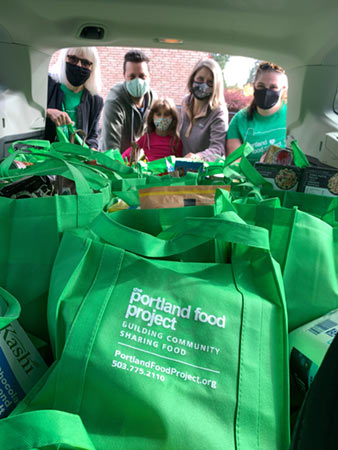
It started as a handful of people collecting 237 pounds of supplies for food-insecure Portlanders from 14 donors in 2012. In 2019, Portland Food Project volunteers collected donations from about 1,500 households that totaled nearly 114,000 pounds of food.
Donors buy one extra grocery item a week, save those for an every-other month collection, then put them in supplied green project bags outside for pick up.
Last year, the pandemic caused a reduction in pick ups that resulted in a drop to nearly 82,500 pounds. But donors increased their financial contributions. And just the first four collections – of six – this year have resulted in more than 95,000 pounds of food.
Peggy Concillo joined the citywide, all-volunteer project five years ago. The Alameda resident and other local neighborhood coordinators collect food from Concordians and residents across the city the second Saturday of each even-numbered month.
The food is divided between 19 Portland area food pantries. Among them are nearby Northeast Emergency Food Pantry, Sharon Community Services and Home Forward at Dekum Court.
The nonprofit organization’s success lies in the neighborhood coordinators, according to Peggy. “They are an amazing bunch of people. They keep the project going.”
They come from all walks of life Peggy joined soon after her retirement as an educator.
“I wanted to do some volunteering, and I knew I wanted to do something different than being in schools. It sounded like a great concept, and it sounded easy,” she said.
“This is a local thing, building your own community and your neighborhood. People feel like they’re having a direct connection, a direct impact in their own community.”
To become a donor or neighborhood coordinator, visit PortlandFoodProject.org. At the same website, financial donations are accepted. In fact, enough money was donated late last year to enable the project to purchase groceries for an extra distribution to pantries in January.
Most coordinators start out as donors, then form their own routes of nearby households, then grow their routes to 15-30 donors.
According to project estimates, coordinators spend four to five hours every other month. That includes reminding their donors when to expect them, picking up the filled green bags from donors’ porches, leaving bags for the next pick up and delivering donations to a drop-off site.
At latest count, 42 other towns across the country have initiated programs modeled after Portland’s. Some of those are in the new hometowns of former Portland Food Project volunteers.
“Our motto serves other areas just as well as Portland,” Peggy explained. “Sharing food, building community.”
Nancy Varekamp is semiretired from her career in journalism, public relations and – her favorite work engagement – writing and editing targeted newsletters.